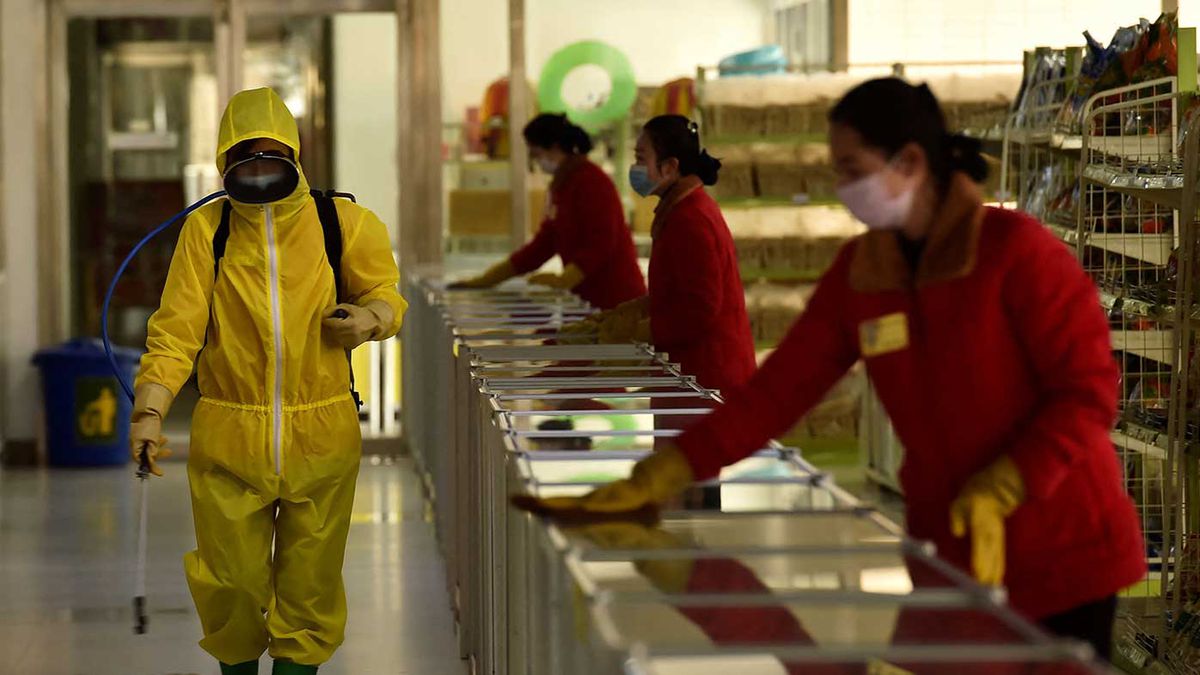NORTH Korea has confirmed its first COVID-19 outbreak on Thursday, calling it the “gravest national emergency” and ordering a national lockdown, with state media reporting an Omicron variant had been detected in Pyongyang.
According to Reuters, the first public admission of COVID-19 infections highlights the potential for a major crisis in a country that has refused international help with vaccinations and kept its borders shut.
As of March, no cases of COVID-19 have been reported, according to the World Health Organisation (WHO), and there is no official record of any North Koreans having been vaccinated.
“A most serious emergency case of the state occurred: A break was made on our emergency epidemic prevention front where has firmly defended for two years and three months from February 2020,” official KCNA news agency said.
The report – without providing details on case numbers or possible sources of infection – further noted that samples taken on May 8 from people in Pyongyang who were experiencing fevers revealed a sub-variant of the Omicron virus, also known as BA.2.
The report was published after North Korean leader Kim Jong Un led a Workers’ Party meeting on Thursday to discuss responses to the outbreak.
KCNA further reported that Kim had ordered all cities and counties in North Korea to “strictly lock down” their regions in order to prevent the spread of the coronavirus, adding that emergency reserve medical supplies would be mobilised.
“The state epidemic prevention work shall be switched over to the maximum emergency epidemic prevention system,” said KCNA.
Despite the fact that North Korea has never before confirmed a single COVID-19 case in the country, officials in South Korea and the US have doubted that the country is COVID-free as cases of the Omicron variant were widely reported in neighbouring South Korea and China.
Strict quarantine measures including border lockdowns have been enforced in the isolated North since the pandemic started in early 2020.
In July that year Kim declared an emergency and imposed a lockdown on Kaesong near the inter-Korean border for three weeks after a man who defected to the South in 2017 returned to the city showing coronavirus symptoms.
Latest data from WHO indicated that 64,207 of North Korea’s more than 24.7 million people received COVID-19 testing; all had been found negative as of March 31.
North Korea has declined shipments of vaccine from the COVAX global COVID-19 vaccine-sharing programme and the Sinovac Biotech vaccine from China, suggesting no civilians may have been vaccinated.
The KCNA report also noted that Kim told the Workers’ Party meeting that the latest emergency quarantine system’s purpose is to stably control and manage the spread of the coronavirus and quickly heal infected people to eliminate the source of transmission in the shortest time possible.
According to professor of North Korean studies at Kyungnam University in South Korea Lim Eul-chul, a failure to contain coronavirus infections could be an “unprecedented crisis for the Kim Jong-un regime”.
“Given a more inferior vaccination situation and weaker testing capacity and public health infrastructure compared to China, plus the lack of intensive care units, there’s potential for scores of casualties,” he said.
Meanwhile Cheong Seong-chang of the Sejong Institute pointed out that North Korea’s nationwide lockdown had the potential to be immensely disruptive.
“With time, North Korea is likely to face severe food shortages and, as China is experiencing now, massive confusion,” he said.
South Korea’s central bank in an annual report in July 2021 reported that the North’s economy suffered its biggest contraction in 23 years in 2020 – weighed down by COVID-19 border controls, United Nations (UN) sanctions and bad weather.
Furthermore, Professor Yang Moo-jin from the University of North Korean Studies in Seoul commented that the fact that Kim had called a party politburo meeting at dawn and that state media had immediately published the deliberations indicates the urgency of the situation.
It could be an indirect plea to the international community for help, Yang added. – May 12, 2022









